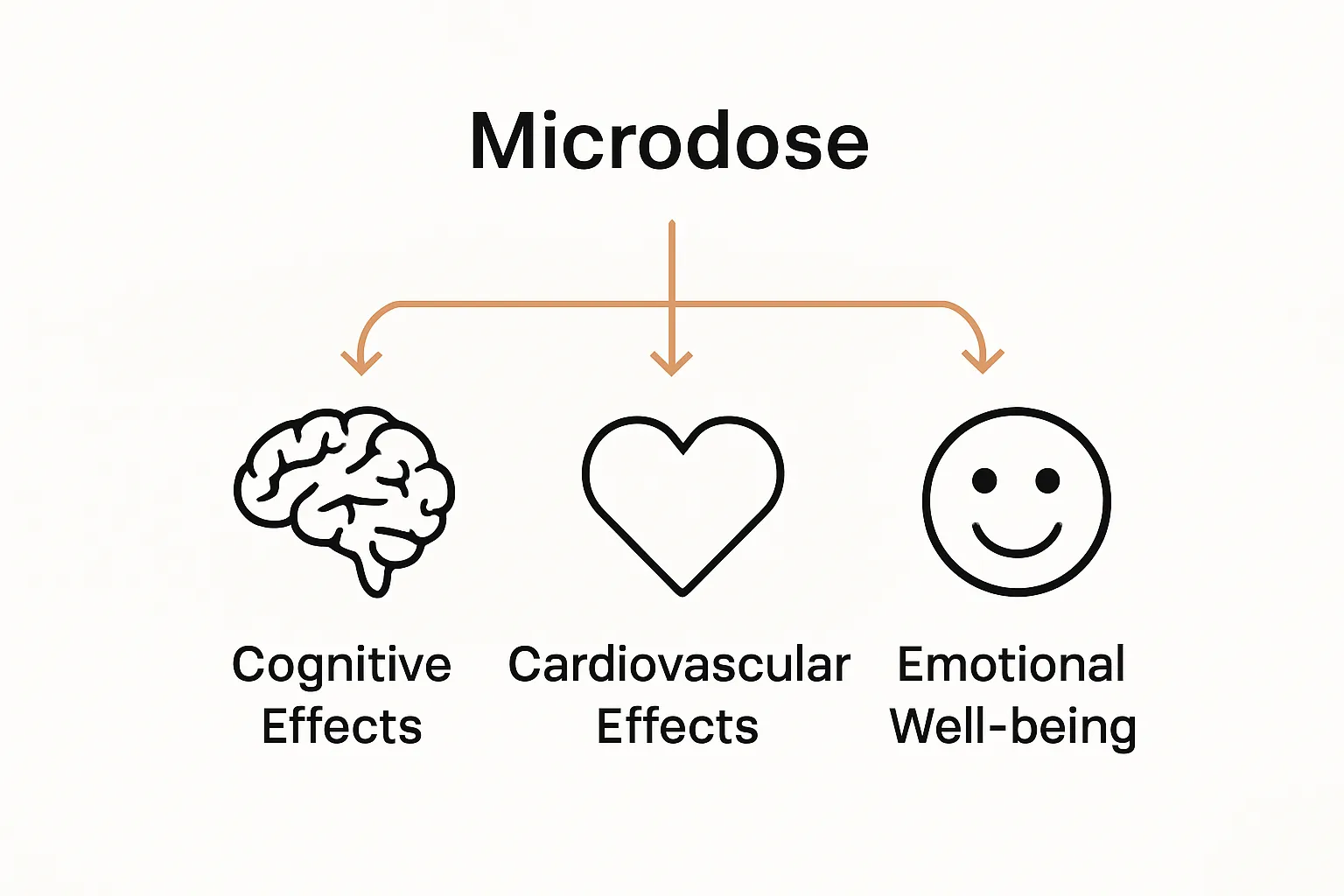Microdosing has quickly shifted from a fringe idea to a popular wellness trend. Surveys now show that over 20 percent of young professionals have tried microdosing psilocybin to boost focus or ease anxiety. That might sound like just another lifestyle fad taking over Instagram. But these tiny doses hold real potential for quiet changes inside your body and mind—especially for your heart and emotional health. The real story goes beyond buzz, and it could change how you think about your daily wellbeing.
Table of Contents
- What Is Microdosing And Why Is It Gaining Popularity?
- The Relationship Between Microdosing And Heart Health
- How Microdosing Affects Brain Chemistry And Emotional Well-Being
- Potential Benefits And Risks Of Microdosing On Heart Health
- Exploring Legal Access To Microdose Products In Canada
Quick Summary
| Takeaway | Explanation |
|---|---|
| Microdosing enhances cognitive function without major effects | Consuming low doses of psychedelics can improve focus and emotional balance while allowing full cognitive capabilities. |
| Caution is essential for those with heart conditions | Individuals with pre-existing cardiovascular issues should consult healthcare professionals before exploring microdosing. |
| Legal access to microdoses is evolving in Canada | Canada’s regulatory framework now offers therapeutic access to psilocybin, enabling legal microdosing under medical supervision. |
| Potential cardiovascular impacts of microdosing exist | Even small doses may influence heart rate and blood pressure, necessitating awareness of personal health risks. |
| Microdosing supports emotional well-being and resilience | Neurochemical interactions can help enhance emotional regulation and decrease anxiety symptoms, offering a holistic mental health approach. |
What is Microdosing and Why is it Gaining Popularity?
Microdosing represents a nuanced approach to consuming psychedelic substances at extremely low, sub-hallucinogenic doses, primarily involving psilocybin mushrooms. Unlike traditional psychedelic experiences that induce intense altered states, microdosing focuses on subtle cognitive and emotional enhancements without perceptible psychoactive effects.
The Fundamental Concept of Microdosing
At its core, microdosing involves consuming approximately 1/10th to 1/20th of a standard recreational dose. This careful, calculated approach allows individuals to potentially experience incremental benefits while maintaining full cognitive functionality. Researchers at Johns Hopkins University have been investigating how these minimal doses might interact with neural pathways, suggesting potential improvements in mood regulation, creativity, and cognitive performance.
Emerging Cultural and Wellness Trends
The rising popularity of microdosing stems from several interconnected factors. Modern professionals and wellness enthusiasts are increasingly seeking alternative methods for mental optimization. Individuals report potential benefits like improved focus, reduced anxiety, and enhanced emotional resilience. These anecdotal experiences, combined with emerging scientific research, have transformed microdosing from a counterculture practice to a mainstream wellness exploration.
The trend is particularly compelling because microdosing offers a middle ground between traditional pharmaceutical interventions and holistic wellness practices. By exploring microdosing for creativity, individuals are discovering new pathways to mental performance and emotional balance.
Key motivations for individuals exploring microdosing include:
- Potential cognitive enhancement
- Natural approach to mental wellness
- Minimal perceptible alterations to daily functioning
- Interest in alternative mental health strategies
While scientific research continues to evolve, the growing interest in microdosing reflects a broader societal shift towards personalized, holistic approaches to mental and emotional well-being.
The Relationship Between Microdosing and Heart Health
Understanding the potential cardiovascular implications of microdosing requires a nuanced examination of neurochemical interactions, physiological responses, and emerging scientific research. While microdosing has gained popularity for potential cognitive benefits, its specific impact on heart health remains an area of active investigation and scientific curiosity.
Neurochemical Interactions and Cardiovascular Response
Research from the National Institutes of Health indicates that psychedelic compounds interact with serotonin receptors present throughout the cardiovascular system. These interactions can potentially influence heart rate, blood pressure, and overall cardiovascular function.
The subtle neurochemical mechanisms of microdosing suggest that even minimal doses might trigger measurable physiological responses, making comprehensive understanding critical for responsible use.
Potential Cardiovascular Considerations
Microdosing presents a complex landscape of potential cardiovascular interactions. While traditional high-dose psychedelic experiences are known to cause temporary cardiovascular changes, microdosing’s effects are less understood. Learn more about potential risks with our microdosing safety guide, which provides deeper insights into responsible consumption.
Key cardiovascular considerations for individuals exploring microdosing include:
- Potential variations in heart rate
- Possible short-term blood pressure fluctuations
- Individual variability in physiological responses
- Importance of personal health history and pre-existing conditions
Individuals with pre-existing cardiovascular conditions should approach microdosing with heightened caution. Consulting healthcare professionals and undergoing comprehensive medical assessments can provide personalized insights into potential risks and individual tolerance.
While current research suggests minimal immediate cardiovascular risks during microdosing, the scientific community continues to emphasize the need for more comprehensive, long-term studies to fully comprehend the nuanced interactions between psychedelic compounds and heart health.
How Microdosing Affects Brain Chemistry and Emotional Well-Being
Microdosing represents a fascinating intersection of neurochemistry and psychological wellness, offering subtle yet potentially transformative interactions with the brain’s complex molecular landscape. By introducing minimal quantities of psychedelic compounds, individuals may experience nuanced shifts in cognitive processing and emotional regulation.
Neurochemical Mechanisms of Microdosing
Research from Frontiers in Psychiatry suggests that psychedelic compounds interact with serotonin receptors, particularly the 5-HT2A receptor, which plays a crucial role in mood modulation and cognitive flexibility. These interactions can potentially enhance neural plasticity, allowing for more adaptive thinking patterns and emotional responsiveness.
Emotional Processing and Psychological Resilience
Microdosing appears to influence emotional well-being through intricate neurological pathways. The compounds may help reduce rumination, decrease anxiety symptoms, and promote a more balanced emotional state. Explore how microdosing intersects with meditation practices to understand the holistic approach to mental wellness.
Key potential psychological benefits of microdosing include:
- Enhanced emotional regulation
- Increased cognitive flexibility
- Reduced symptoms of anxiety and depression
- Improved stress response mechanisms
The neurological impact extends beyond immediate emotional states. Emerging evidence suggests that microdosing might support long-term neuroplasticity, potentially helping individuals develop more resilient cognitive and emotional frameworks.
While the scientific community continues to investigate these complex interactions, preliminary research indicates that microdosing could offer a promising avenue for individuals seeking alternative approaches to mental health and emotional well-being. The subtle yet potentially significant changes in brain chemistry represent an exciting frontier of psychological research and personal exploration.

Potential Benefits and Risks of Microdosing on Heart Health
Microdosing represents a complex interaction between psychedelic compounds and cardiovascular function, presenting both potential advantages and critical considerations for individuals exploring this emerging wellness approach. Understanding the nuanced relationship between microdosing and heart health requires careful examination of scientific evidence and individual physiological responses.
Cardiovascular Response Mechanisms
Research published in cardiovascular science journals indicates that psychedelic compounds can trigger subtle but measurable changes in heart rate and blood pressure. These physiological responses stem from interactions with serotonin receptors distributed throughout the cardiovascular system, suggesting that even minimal doses might produce discernible cardiovascular effects.
Potential Risks and Precautionary Considerations
Individuals contemplating microdosing must recognize the importance of personalized medical assessment. Explore our comprehensive microdosing safety guide to understand protocols for responsible consumption. Cardiovascular risks may vary significantly based on individual health profiles, making professional medical consultation crucial.
Key cardiovascular considerations for potential microdosing participants include:
- Transient increases in heart rate
- Potential short-term blood pressure fluctuations
- Individual variability in physiological response
- Importance of pre-existing cardiovascular conditions
While emerging research suggests minimal immediate risks, the scientific community emphasizes the need for extensive long-term studies. Potential cardiovascular interactions remain an active area of investigation, with researchers continuing to explore the intricate relationships between psychedelic compounds and heart health.

Prospective microdosing participants should approach this wellness strategy with informed caution, prioritizing personal health assessments and maintaining open communication with healthcare professionals throughout their exploration.
To help readers compare the potential benefits and risks of microdosing on heart health, the following table summarizes the key cardiovascular effects discussed in the article.
| Aspect | Potential Benefits | Potential Risks |
|---|---|---|
| Heart Rate | Possible support for normal functioning | Transient increases may occur |
| Blood Pressure | Subtle regulation for some individuals | Potential short-term fluctuations |
| Emotional Well-Being Impact | Enhanced stress response and emotional resilience | Individual variability in response |
| Pre-Existing Conditions | None for healthy individuals | Heightened caution required |
| Research Status | Promising early findings | Need for more long-term studies |
Exploring Legal Access to Microdose Products in Canada
Navigating the legal landscape of microdose products in Canada requires understanding the nuanced regulatory framework governing psychedelic substances. While federal regulations continue to evolve, opportunities for legal access have expanded, creating new pathways for individuals seeking alternative wellness approaches.
Current Legal Landscape for Psilocybin
Health Canada’s official documentation indicates a progressive approach toward regulated psychedelic substances. Recent policy shifts have created specialized exemptions for medical and research purposes, allowing controlled access to psilocybin through specific legal channels. Therapeutic access represents the primary legal mechanism for individuals interested in microdosing.
Pathways to Legal Microdose Access
Canadian residents have several regulated routes for obtaining microdose products. Learn more about current psilocybin legality in Canada to understand the intricate legal framework. These pathways typically involve:
- Section 56 exemptions for medical treatment
- Research study participation
- Compassionate access programs
- Specialized medical prescriptions
The legal framework surrounding microdosing continues to develop, with increasing recognition of potential therapeutic benefits. Healthcare practitioners and licensed providers play a crucial role in facilitating responsible, legal access to microdose products.
Individuals seeking legal microdose access must navigate a complex system that prioritizes medical oversight and personal health assessment.
To clarify the current regulated options for legally accessing microdose products in Canada, this table organizes the available pathways and their main characteristics.
| Legal Pathway | Description | Requirements |
|---|---|---|
| Section 56 Exemption | Government-approved medical exception for psilocybin use | Physician support, Health Canada approval |
| Research Study Participation | Access through involvement in clinical research | Enrollment in approved studies |
| Compassionate Access Program | Special programs for severe or terminal health conditions | Documented qualifying condition |
| Specialized Medical Prescription | Prescription by licensed healthcare provider | Appropriate medical assessment |
| Professional medical consultation remains the most reliable approach for exploring microdosing within Canada’s current regulatory environment, ensuring both legal compliance and personal safety. |
Ready to Explore Safe Microdosing for Mental and Heart Wellness?
Understanding how microdosing affects your heart and mental health brings up real concerns. Many readers want reliable guidance and safe options as they seek cognitive support and emotional balance. If you are curious about the practical benefits of microdosed psilocybin for mental clarity and wellness but worry about its impact on your cardiovascular system, you are not alone. Our MICRODOSING Archives delve deeper into current research, safety insights, and user experiences, giving you reassurance and trusted information.

Take the next step with confidence. Visit Kind Stranger for thoughtfully crafted microdosed psilocybin capsules and gummies, designed for effectiveness and safety. Learn more about microdosing protocols and heart health by exploring our Mental Health category and discovering products tailored to support your wellness goals. The right resources and solutions are just a click away. Act today for greater mental clarity and peace of mind.
Frequently Asked Questions
What is microdosing?
Microdosing involves taking very small, sub-hallucinogenic doses of psychedelic substances, primarily psilocybin mushrooms, to experience subtle cognitive and emotional enhancements without noticeable psychoactive effects.
How does microdosing affect heart health?
Microdosing may interact with serotonin receptors throughout the cardiovascular system, potentially influencing heart rate and blood pressure. However, the specific cardiovascular effects of microdosing are still under investigation.
Are there any risks associated with microdosing and heart health?
While current research indicates minimal immediate cardiovascular risks, individuals with pre-existing heart conditions should approach microdosing cautiously and consult healthcare professionals for personalized medical assessments.
What are the potential psychological benefits of microdosing?
Microdosing may enhance emotional regulation, increase cognitive flexibility, reduce anxiety and depression symptoms, and improve overall stress response mechanisms, offering a potential alternative approach to mental health and emotional well-being.
Recommended
- Risks of Microdosing: What Canadians Should Know in 2025 • KIND STRANGER
- Microdosing and Meditation: Enhance Focus and Wellbeing in 2025 • KIND STRANGER
- Psilocybin Microdosing Schedule Guide 2025: Safe and Effective Plans • KIND STRANGER
- Microdosing for Creativity: Boost Ideas and Focus in 2025 • KIND STRANGER


Comments
There are no comments yet.